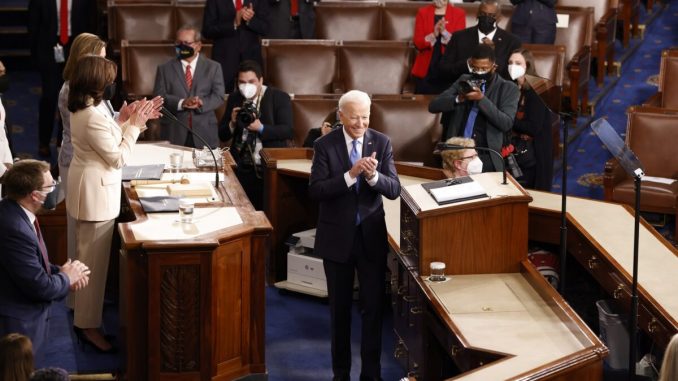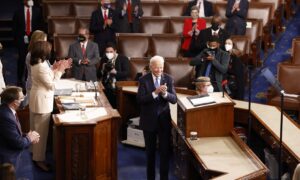

Commentary
The funniest headline of the year to date popped up in The Washington Post a few weeks ago. A joint effort by the Post’s Annie Linskey, Jeff Stein and Ashley Parker promised readers to explain: “How Joe Biden tamed the left—at least for now.”
Ha ha. Who didn’t already know by April Fool’s day that President Biden had “tamed” the left—though “tamed” hardly seems like the right word—by giving it everything the left has ever dreamed of getting from an American president?
The announcement in Biden’s speech to a joint session of Congress of another $1.8 trillion in new spending and tax credits, bringing the total since this president took office to some $6 trillion, shows that the liberality with which he is handing out borrowed or imaginary money—all the taxpayers’ money having long since been spoken for—to every favored constituency and pet project of the left is not letting up any time soon.
Yet it suits the Post, like the rest of the media, to pretend that, at some level anyway, the old rules of politics still apply, that the left can have been only temporarily placated by such largesse and that, somewhere, sober and responsible politicians are still arguing—as they have done for centuries—about what priorities should obtain in the allocation of scarce resources.
It’s as if neither the media nor the politicians themselves have yet noticed that we are living in a new political world where everybody but a few malcontents appears to have agreed that resources are now, if not unlimited, to be treated as if they were.
Both media and politicians may be correct in thinking— if this is what they are thinking—that they can’t come right out and say this without alienating voters. I was amused to read in a foreign newspaper on the morning after the president’s speech the caution that, “Sure, everyone likes free money: but plenty of Americans, with varying political loyalties, are aware that nothing comes without a cost.”
Well, it used to be so, but I’m not so sure it is anymore. And the feebleness of the pretense that all the new benefits are to be paid for only by “the rich,” and by the discovery of hundreds of billions of dollars in taxes hitherto uncollected by an underfunded and lackadaisical IRS, suggests that Biden, or whoever is doing his thinking for him these days, doubts it too.
In other words, it’s obvious that he’s just going through the motions of the old politics.
We’ve heard these things before. Remember the “waste, fraud and abuse” that were going to pay for—something, I forget what? Not to mention the “millionaires and billionaires” from whom, exclusively, former President Obama promised back in 2011to squeeze the new tax dollars that he claimed he needed for new social spending.
Surely, after the blowout spending and ballooning deficits of the decade since Obama made that promise, not even the most credulous of his then vice-president’s supporters in 2021, in the media or out of them, can believe in his merely pro-forma reiteration of such promises?
I don’t know whether or not Dick Cheney has ever confirmed or denied that he told Paul O’Neill back in 2004 that “Reagan proved that deficits don’t matter,” but every president since then has behaved as if that were the case.
But for Biden to pretend, after all this time, to think deficits do matter, and must be paid for, looks like mere superstition, a verbal oblation to the Gods of Fiscal Prudence in whom neither he nor anyone else any longer believes.
Last year, when the revolutionary nature of the Democratic opposition to President Trump was becoming clear, Barton Swaim wrote in The Wall Street Journal that the psychology of the revolutionaries was based on the expectation that the electorate had swung so far to the right in 2016 that it would be ripe for an equally wide departure to the left of the mainstream in 2020.
The comparison was with 1972, when the Democrats had held up the painted devil of Richard Nixon—the original of the even more luridly sketched Devil Trump—as a reason for supporting the radical corrective of George McGovern.
In the event, of course, the Democratic left—perhaps in the light of how that election had turned out for them—tamped down the revolutionary rhetoric long enough to nominate the alleged moderate Joe Biden and then managed, by hook or by crook, to get him elected.
But Swaim may have been onto something all the same.
Except that it wasn’t so much Trump’s alleged “right-wing extremism” that licensed the left-wing extremism of the Democrats. Rather, it was the proof he gave, or seemed to them to give, that the old rules of politics no longer applied.
Meanwhile, the new science of Modern Monetary Theory has purported to demonstrate that the old rules of economics no longer apply either, and that to pay for the things they want, governments can simply print more fiat money.
In his speech, Biden didn’t quite dare to abandon all pretense of fiscal responsibility, but he showed—as he has done since taking office—that that pretense is now utterly hollow.
By the old rules of politics and of economics he might be expected to pay a heavy price for that bet on a brave new world of unlimited abundance, so we’ll soon see whether or not those rules really continue to apply.
James Bowman is a resident scholar at the Ethics and Public Policy Center. The author of “Honor: A History,” he is a movie critic for The American Spectator and the media critic for the New Criterion.
Views expressed in this article are the opinions of the author and do not necessarily reflect the views of The Epoch Times.






Be the first to comment